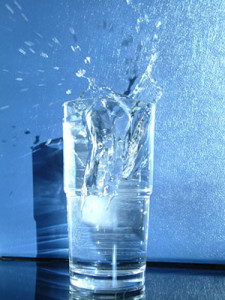 According to a report published by CBS, 75% of Americans don’t drink the 10 daily cups of water recommended by the Institute of Medicine. Going throughout the day in a state of mild dehydration may not cause any immediate concerns, but it will eventually take its toll on your body and health. If you fall into the majority and don’t drink enough water, you should take note of what I’m about to tell you.
According to a report published by CBS, 75% of Americans don’t drink the 10 daily cups of water recommended by the Institute of Medicine. Going throughout the day in a state of mild dehydration may not cause any immediate concerns, but it will eventually take its toll on your body and health. If you fall into the majority and don’t drink enough water, you should take note of what I’m about to tell you.
Water is essential for every living organism on Earth, and humans are no exception. Our bodies are comprised of 60-70% water; it’s in our muscles, tissue, fat, ligaments, and even our brains. Without H2O, our organs would fail and our bodies would shut down. Studies have even shown that blood plasma is comprised of approximately 90% water.
Water plays a key role in the body’s ability to transport blood to areas where it’s needed. This is particularly important when you have the cold, flu or other types of infectious illnesses. Water carries white blood cells directly to the infection, shortening the duration of the illness while promoting faster recovery times.
Bodybuilders and athletes need water to improve muscle recovery. When you lift weights at the gym, tiny tears develop in your muscle fibers. This is actually good, because your muscles will be bigger and stronger when you recover. In order for this recovery to occur, however, muscles need key nutrients like protein. Of course, water is responsible for carrying these nutrients to the torn/damaged muscles.
Yet another reason why should put forth the effort to stay hydrated is because water helps regulate the body’s metabolic processes. People who don’t drink enough H2O are more likely to experience lower metabolism levels, which opens the doors to a wide variety of problems and complications. Keeping your body hydrated, however, will promote healthy metabolism levels.
Last but not least, water is a critical element in digestive health. Among other things, it’s responsible for flushing out waste from our bodies. Without water, food would stick to the walls of the intestines, causing heartburn, ulcers, blockages, and other problems.
So, how much water should you drink? The Institute of Medicine recommends 10 cups per day, but this isn’t necessarily accurate. The “right” amount varies depending on your age, metabolism, how much you exercise, diet & nutrition, etc. Just remember to drink pure water – not sodas or other sugary beverages – when you are thirsty.
Give me a call for more tips on how to improve your health and well-being.
